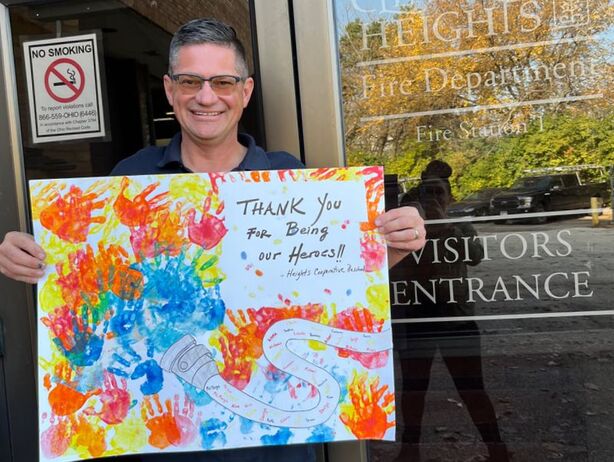|
In October, the local Fire Department visited Heights Cooperative Preschool for National Fire Prevention Week. Learning about fire safety is so important to start early, so kids know from a young age how to handle the dangers of fire. This year also marks 100 years since Fire Prevention Week was made official!
Here's what we learned when the fire department visited our school. 1: Create a Family Fire Safety Plan Create an emergency fire plan with your family and friends, including where you would go if you had to evacuate. Be prepared for an emergency by having a disaster plan in place, having enough supplies on hand, and practicing evacuation drills with your family. Everyone in your home should know the fire safety plan, and children should be taught how to use the fire alarm and exit safely. Set up emergency contacts in case of an emergency so your kids know who to call for help. Make your home fire escape plan and safety action plan using these guides from the National Fire Prevention Association. 2: Teach Your Kids Age-Appropriate Fire Safety Talk to your kids about fire safety as often as possible, including when you use the stove or if you are making a fire outside. Make sure they know what to do if they see a fire, and be sure they know the locations of the exits in their home. Make sure your kids know how to respond to a fire alarm and how to use the fire escape routes. As your kids grow older, teach them how to use a fire extinguisher and involve them in replacing the batteries in smoke alarms every year so they are more engaged with your fire safety practices. Visit Sparky.org for lots of online games and resources for your kids to learn about fire safety! 3: Store and Use Household Items Properly Make sure all materials that could create a fire are stored in a safe place, such as candles out of reach of children and cigarettes out of sight. Store flammable materials in cool, dry places and away from heat sources. Follow these simple tips for safe fire safety:
4: Install Smoke Detectors and Carbon Monoxide Detectors Fire safety is not only about knowing the fire safety rules - it's also about having the proper tools to detect fires and emergencies. Install smoke detectors in each room of your home, and install a carbon monoxide detector in case of an emergency. Make sure your smoke alarms are working properly by testing them monthly and replacing the batteries every year. Smoke from any kind of fire can be dangerous, especially when it's dense or contains chemicals. Make sure your kids know the dangers of smoke, and keep them away from any fires that are burning. As the National Fire Prevention Association says, "Fire is dark!" Though the flames start off bright, soon fires become very dark and smoky. It's important to stay low to the ground so that you aren't breathing or trying to see through the dark smoke. How many smoke alarms do you need? According to the NFPA, "Smoke alarms need to be in every bedroom, outside of the sleeping areas (like a hallway), and on each level (including the basement) of your home. Do not put smoke alarms in your kitchen or bathrooms." 5: Know the School's Fire Safety Plan In addition to knowing your home's fire safety rules, it's important to know the school's fire safety plan. Our classrooms have plans in place to evacuate students in case of a fire. Make sure you know where your child is in case of an emergency, and be sure to talk to your child's teacher about their fire safety plan. Fire safety is not a one-time event - it's something that needs to be practiced regularly so your family is prepared in case of an emergency. Make sure you and your family members are familiar with fire safety tips, and practice evacuation drills on a regular basis.
0 Comments
Your comment will be posted after it is approved.
Leave a Reply. |

 RSS Feed
RSS Feed